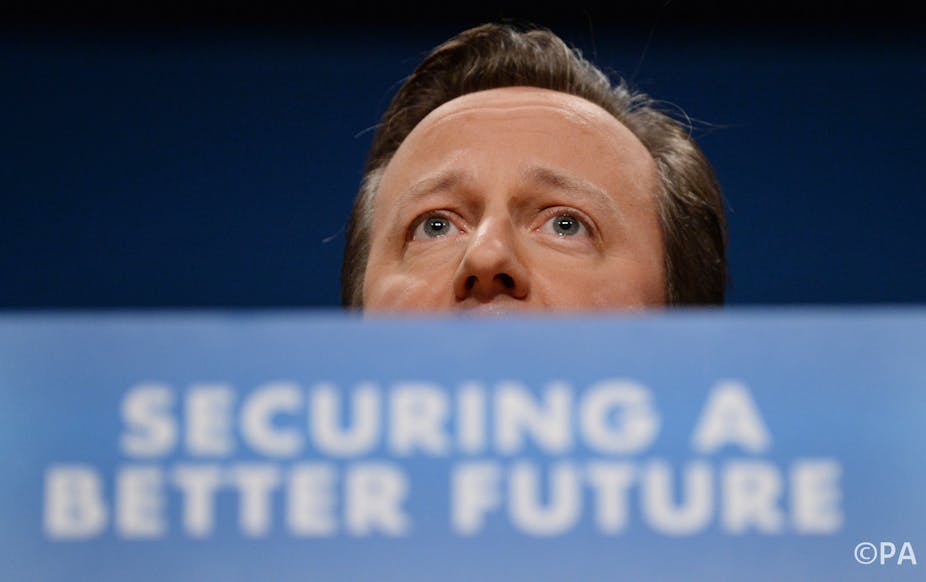In recent days the Eurosceptic wing of the Conservative Party seems to have renounced its suicidal tactics. It took three defections to UKIP – those of Eurosceptic agitators-in-chief in the Commons, Douglas Carswell and Mark Reckless and of the former deputy-mayor of London, Richard Barnes – to make the euro-rebels realise that the more they bang on about Europe, the more they help UKIP become a Westminster party and the more they risk their own seats.
Doubtless, the latest polling evidence, which suggests that it will be very, very difficult for the Conservatives to obtain a majority at next year’s election, can explain that sobering effect. But the unity is fragile and the party leadership can’t rely on the rebels to stay quiet forever.
At the moment, the panic in Conservative HQ is real. The leadership anticipates more defections to UKIP and backbenchers fear for their seats. So it is not surprising that a substantial part of the Conservative Party annual conference was devoted to condemning the “unforgivable and dishonourable” behaviour of Mark Reckless.
Potential defectors have been quick in their declarations of loyalty to the party and to the prime minister. There are nine names doing the rounds but most have rushed to dampen rumours about their future. The MEP Daniel Hannan – who believes the Conservatives should build an alliance with UKIP – has given an assurance that he is not planning to leave the party as have the backbenchers Gordon Henderson and Chris Kelly.
For the time being, the potential defectors to UKIP, but also those who like to foment unrest in the backbenches at every sign – real or imagined – of Brussels overreach, seem to understand the electoral dangers of toying with European fire. Even the arch-Eurosceptic, Bill Cash, admitted that “if you vote UKIP, you get Labour, no referendum and even more Europe”.
But for how long will this unity last? This is the question that the leadership of the party is asking at the moment. Judging by the statements of the prime minister and other frontbenchers, no one seems to believe that this unity will be long-lasting. That is why Cameron and other members of the government spent most of the Conservative Party Conference sweet-talking the potential defectors and the veteran rebels with promises of “tough action” on Europe, immigration and human rights.
Cameron’s change of language was marked. He said he was ready to vote for Britain’s withdrawal from the European Union if he does not obtain the reforms he wants from Brussels and claimed to have no emotional attachment to the European project. And if this tough talk failed to steady the nerves of the most hard-core Eurosceptics, the prime minister had another gift. He waved the flag bearing of that other great legend of British Eurosceptism: the defence of imperial measures.

The prime minister has also tried to divert attention from the in/out referendum to areas in which he feels he can deliver. Immigration from within the EU is now at the top of his reform agenda, for instance. Here, Cameron benefits from a changing mood in Europe. The German chancellor, Angela Merkel, vouches for the integrity of the single market but contemplates the possibility of restricting access to benefits for EU migrants. But it could be a while before this produces results.
The second battle line drawn by Cameron is the European Convention on Human Rights. In his speech he announced that the next Conservative government would scrap the Human Rights Act to replace with a British bill of rights.
Cameron’s harsh language on Europe and promise to withdraw from the ECHR might placate the party Euro-rebels until the by-elections prompted by the defections of Carswell and Reckless, but if the results prove to be disappointing (and research suggests they may be in Clacton), that truce may break.
More to the point, the underlying cause of Conservative defections to UKIP and parliamentary rebellions on Europe is the unresolvable schism within the Conservative Party. It divides moderate Eurosceptics who want to remain in a reformed EU and those who want to leave as soon as possible. As Reckless attests, this schism is becoming wider because of a growing mistrust of the prime minister’s intentions.
The prevailing feeling in the backbenches is that the Conservative party leadership is not really committed to EU reform. That’s why Conservative MPs insist on pushing Cameron to spell out what exactly he wants from Brussels. The euro-rebels also fear that their extensive list of demands for reform – including a new EU treaty – are not taken seriously by the prime minister. By contrast, the government knows that it is next to impossible to deliver most of their demands. At a fringe meeting at the Conservative Party conference, the foreign secretary, Philip Hammond, was sufficiently candid to admit that a new EU treaty is unlikely before the referendum on EU membership in 2017.
Even though the Eurosceptics have other things to worry about at the moment, as long as the mistrust and the fundamental misunderstandings about the role of Britain in Europe persist, their antics will continue to periodically flare up. And each time they do, they destabilise the government a little more, undermining the party’s chances of securing a majority at next year’s elections.

